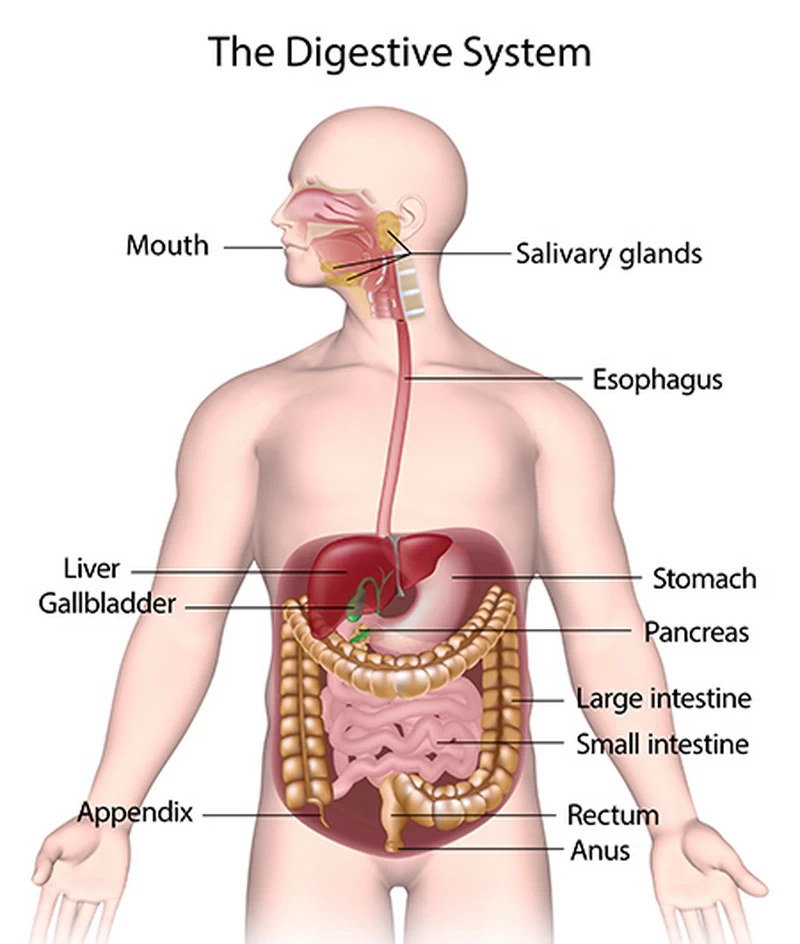What is the digestive system? 什么是消化系统?
The digestive system is made up of the gastrointestinal tract—also called the GI tract or digestive tract—and the liver, pancreas, and gallbladder. The GI tract (胃肠道) is a series of hollow organs joined in a long, twisting tube from the mouth to the anus. The hollow organs that make up the GI tract are the mouth, esophagus (食道), stomach, small intestine, large intestine, and anus. The liver, pancreas, and gallbladder are the solid organs of the digestive system. ( from niddk.nih.gov)
消化系统由胃肠道( gastrointestinal tract 消化道)、肝脏、胰腺和胆囊组成。胃肠道是由一系列中空的器官组成的,它们连接在一个从口腔到肛门的长而扭曲的管道中。组成胃肠道的中空器官有口腔、食道、胃、小肠、大肠和肛门。肝脏、胰腺和胆囊是消化系统的固体器官。
The small intestine (小肠) has three parts. The first part is called the duodenum (十二指肠 /ˌduː.əˈdiː.nəm/). The jejunum (空肠 /dʒɪˈdʒuː.nəm/ ) is in the middle and the ileum (回肠 /ˈɪl.i.əm/) is at the end. The large intestine (大肠) includes the appendix (阑尾), cecum (盲肠 /ˈsiː.kəm/) colon, and rectum. The appendix is a finger-shaped pouch attached to the cecum. The cecum is the first part of the large intestine. The colon (结肠)is next. The rectum (直肠/ˈrek.təm/)is the end of the large intestine. ( from niddk.nih.gov)
小肠有三部分。第一部分叫做十二指肠。空肠在中间,回肠在末端。大肠包括阑尾、盲肠、结肠和直肠。阑尾是附着在盲肠上的指状囊。盲肠是大肠的第一部分。下一个是冒号。直肠是大肠的末端。

人体消化系统简图(Credit:niddk.nih.gov)
What is a peptic ulcer? 什么是消化性溃疡?
Peptic ulcer (消化性溃疡)disease is a condition in which painful sores or ulcers develop in the lining of the stomach or the first part of the small intestine (the duodenum 十二指肠). Normally, a thick layer of mucus (粘液) protects the stomach lining from the effect of its digestive juices. But many things can reduce this protective layer, allowing stomach acid to damage the tissue. (from clevelandclinic.org)
消化性溃疡是一种胃壁或小肠第一部分(十二指肠)出现疼痛的溃疡或溃疡的疾病。正常情况下,一层厚厚的粘液保护胃粘膜不受消化液的影响。但是很多东西会减少这层保护层,让胃酸破坏组织。
What are the symptoms of a peptic ulcer? 消化性溃疡的症状是什么?
pain or discomfort in the upper part of your abdomen, anywhere between your belly button and breastbone
腹部上部的疼痛或不适,在肚脐和胸骨之间的任何地方
feeling full too soon while eating a meal 吃饭时过早感到饱
feeling uncomfortably full after eating a meal 吃饭时过早感到饱
nausea and vomiting 恶心和呕吐
bloating 腹胀
belching 打嗝
腹部上部的疼痛或不适,在肚脐和胸骨之间的任何地方
Many people who have peptic ulcers don’t have any symptoms. They may not develop symptoms until an ulcer leads to complications (并发症). (from niddk.nih.gov)
许多患有消化性溃疡的人没有任何症状。他们可能不会出现症状,直到溃疡导致并发症。
What are the causes of peptic ulcer? 消化性溃疡的原因是什么?
The most common cause of ulcers is infection of the stomach by bacteria called Helicobacter pylori (H pylori) 幽门螺杆菌. Most people with peptic ulcers have these bacteria living in their digestive tract. Yet, many people who have these bacteria in their stomach do not develop an ulcer.
溃疡最常见的原因是胃被幽门螺杆菌感染。大多数消化性溃疡患者的消化道中都有这些细菌。然而,许多胃里有这些细菌的人并没有患上溃疡。
The following factors raise your risk for peptic ulcers:
以下因素会增加患消化性溃疡的风险:
Drinking too much alcohol 喝太多酒
Regular use of aspirin, ibuprofen (布洛芬), naproxen (萘普生), or other nonsteroidal anti-inflammatory drugs非甾体抗炎药 (NSAIDs)
经常使用阿司匹林,布洛芬,萘普生,或其他非甾体抗炎药(NSAIDs)
Smoking cigarettes or chewing tobacco 吸烟或嚼烟
Being very ill, such as being on a breathing machine 病得很重的,如使用呼吸机
Radiation treatments 放射治疗
Stress 压力 (from pennmedicine.org )
How to Treat a peptic ulcer? 如何治疗消化性溃疡?
Treatment for peptic ulcers depends on the cause. Usually treatment will involve killing the H. pylori bacterium (幽门螺杆菌)if present, eliminating or reducing use of NSAIDs (非甾体抗炎药)if possible, and helping your ulcer to heal with medication. (from mayoclinic.org)
消化性溃疡的治疗取决于病因。通常治疗包括杀死存在的幽门螺杆菌,如果可能的话,消除或减少使用非甾体抗炎药,并通过药物帮助溃疡愈合。
